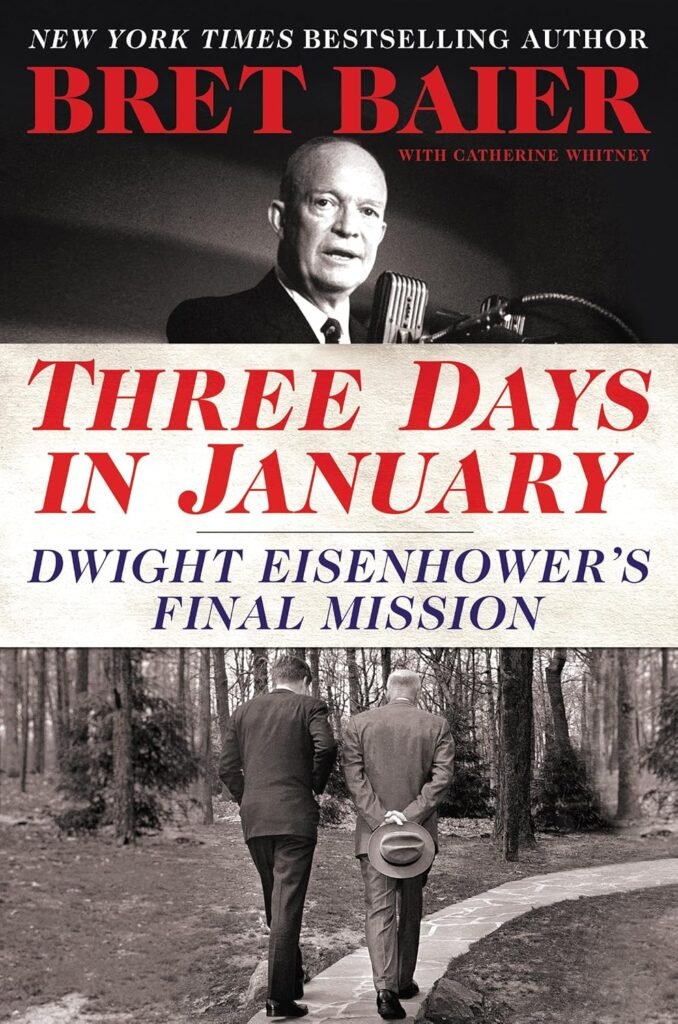Ever wondered what it was like in the final days of a U.S. President’s term, especially one as significant as Dwight Eisenhower? “Three Days in January: Dwight Eisenhower’s Final Mission (Three Days Series) Kindle Edition” offers a fascinating insight into those critical moments. Let’s dive into the specifics of this engrossing read.

Overview of the Book
“Three Days in January” is more than just a historical account; it’s a narrative that brings to life President Eisenhower’s final mission. Written by Bret Baier with a compelling narrative style, this book provides the color and depth often missing from historical records.
What to Expect
You can expect a thorough exploration of the final three days of Eisenhower’s presidency. The book doesn’t just recount the events but dives deep into the emotions and responsibilities tethering the former General to his Oval Office role.
| Feature | Description |
|---|---|
| Author | Bret Baier |
| Genre | History, Politics, Biography |
| Length | Approximately 400 pages |
| Formats Available | Kindle, Hardcover, Paperback, Audiobook |
Detailed Account
The detailed account of Eisenhower’s concerns, reflections, and advice during his final days in office is nothing short of gripping. Baier offers a multi-dimensional portrayal of Eisenhower, allowing readers to understand the gravity of those last moments.
Analysis of Key Themes
One of the stand-out features of “Three Days in January” is its focus on the key themes that defined Eisenhower’s final days. Each theme is handled with precision, making the content engaging and informative.
Leadership and Responsibility
Eisenhower’s sense of responsibility as a leader becomes vividly clear in this book. The challenges he faced, the decisions he had to make, and the advice he gave to his successor are discussed in rich detail.
Transition of Power
The peaceful transition of power is a paramount part of any democracy, and Eisenhower’s transition is portrayed with the respect and seriousness it deserves. Baier meticulously documents the ceremonial and personal aspects of this significant moment.
Reflections on Legacy
The moments of reflection that Eisenhower experiences are deeply moving. His thoughts on his presidency, military career, and legacy provide insight into the mind of one of America’s greatest leaders.
Breakdown of Major Sections
This book isn’t just a chronological recount but a collection of well-curated, thematic sections. Here’s a breakdown of the major sections to give you an idea of what awaits you.
Initial Days
The initial days set the stage for Eisenhower’s final mission. The book gives a background of his presidency and the state of the nation at the time.
The Farewell Address
One of the most memorable pieces of Eisenhower’s final days is his farewell address, which warned against the military-industrial complex. Baier provides context and analysis that bring new understanding to this historic speech.
Final Meetings
The meetings Eisenhower held with key officials, including his successor John F. Kennedy, are gripping and filled with wisdom. The dialogues provide an inside look at the thoughts of a seasoned leader.
The Inauguration Day
Finally, the details of the Inauguration Day highlight the smooth and dignified transfer of power. The descriptions are vivid, making you feel as though you are witnessing history.
Critique of Writing Style
Bret Baier’s writing style is both accessible and engaging. He strikes a balance between scholarly rigor and narrative flair, making this book an enjoyable read for anyone interested in history or politics.
Pros of the Writing Style
- Engaging Narrative: Baier captures your attention with his storytelling ability, ensuring the historical content is never dry.
- Detailed Research: The thorough research shines through, with a plethora of facts and figures backing up every claim.
- Characterization: Baier brings the characters to life, especially Eisenhower, portraying his complexities and nuances effectively.
Cons of the Writing Style
- Pacing Issues: Some readers might find certain sections dragging, particularly where dense political details are discussed.
- Occasional Bias: At times, Baier’s personal admiration for Eisenhower seems to overshadow objective analysis.

Comparison with Similar Books
“Three Days in January” stands out in its genre, but how does it compare to similar books? Here’s a table for a quick comparison with other notable works on Eisenhower.
| Book Title | Author | Focus Area | Unique Selling Point |
|---|---|---|---|
| “Eisenhower in War and Peace” | Jean Edward Smith | Comprehensive Biography | Balanced portrayal of both war and presidential career |
| “Eisenhower: Soldier and President” | Stephen E. Ambrose | Dual Role | Dual focus on military and presidential aspects |
| “Three Days in January” | Bret Baier | Final Days of Presidency | Deep dive into last three days, detailed narrative |
Baier’s book distinguishes itself with its focused narrative, offering a detailed look at a critical yet often overlooked period.
Personal Insights and Stories
One of the book’s most endearing qualities is the personal anecdotes and stories that Baier incorporates. These snippets provide a rare glimpse into Eisenhower’s personality, making the historical figure more relatable.
Friendly Conversations
The friendly conversations between Eisenhower and his close associates offer a softer, more human perspective on the president. These dialogues are not just historically significant but also deeply personal.
Life Outside Politics
Baier doesn’t limit his account to Eisenhower’s political life. He also sheds light on Eisenhower’s personal interests and relationships, making the narrative well-rounded.
Reader Reception and Criticism
“Three Days in January” has generally received favorable reviews, though it is not without its critics.
Positive Feedback
Many readers appreciate the detailed narrative and the fresh perspective on Eisenhower’s final days. The book has been praised for making history accessible and engaging.
Constructive Criticism
On the flip side, some readers feel that the book occasionally lapses into hero-worship, underplaying Eisenhower’s flaws. Constructive criticism also points out that the book’s dense detail may not be to everyone’s taste.
Practical Takeaways
“Three Days in January” is not just a historical account; it offers practical lessons in leadership, diplomacy, and the importance of a smooth transition of power.
Leadership Lessons
Eisenhower’s leadership style, characterized by calm deliberation and a sense of responsibility, offers timeless lessons for today’s leaders. The book highlights the importance of integrity and foresight.
Diplomacy Insights
The delicate diplomacy involved in passing the baton to the next president is another critical takeaway. Eisenhower’s interactions with JFK provide valuable insights into effective diplomatic communication.
Legacy Considerations
Reflecting on one’s legacy is a sobering exercise. Eisenhower’s moments of reflection serve as a reminder to consider the long-term impacts of our actions.
Final Thoughts
“Three Days in January: Dwight Eisenhower’s Final Mission (Three Days Series) Kindle Edition” by Bret Baier is a must-read for anyone interested in American history, leadership, or politics. The book offers a unique glimpse into the final days of a consequential presidency, providing both historical detail and personal insight. Whether you are a history buff or a casual reader, this book is bound to leave a lasting impression.
Disclosure: As an Amazon Associate, I earn from qualifying purchases.


